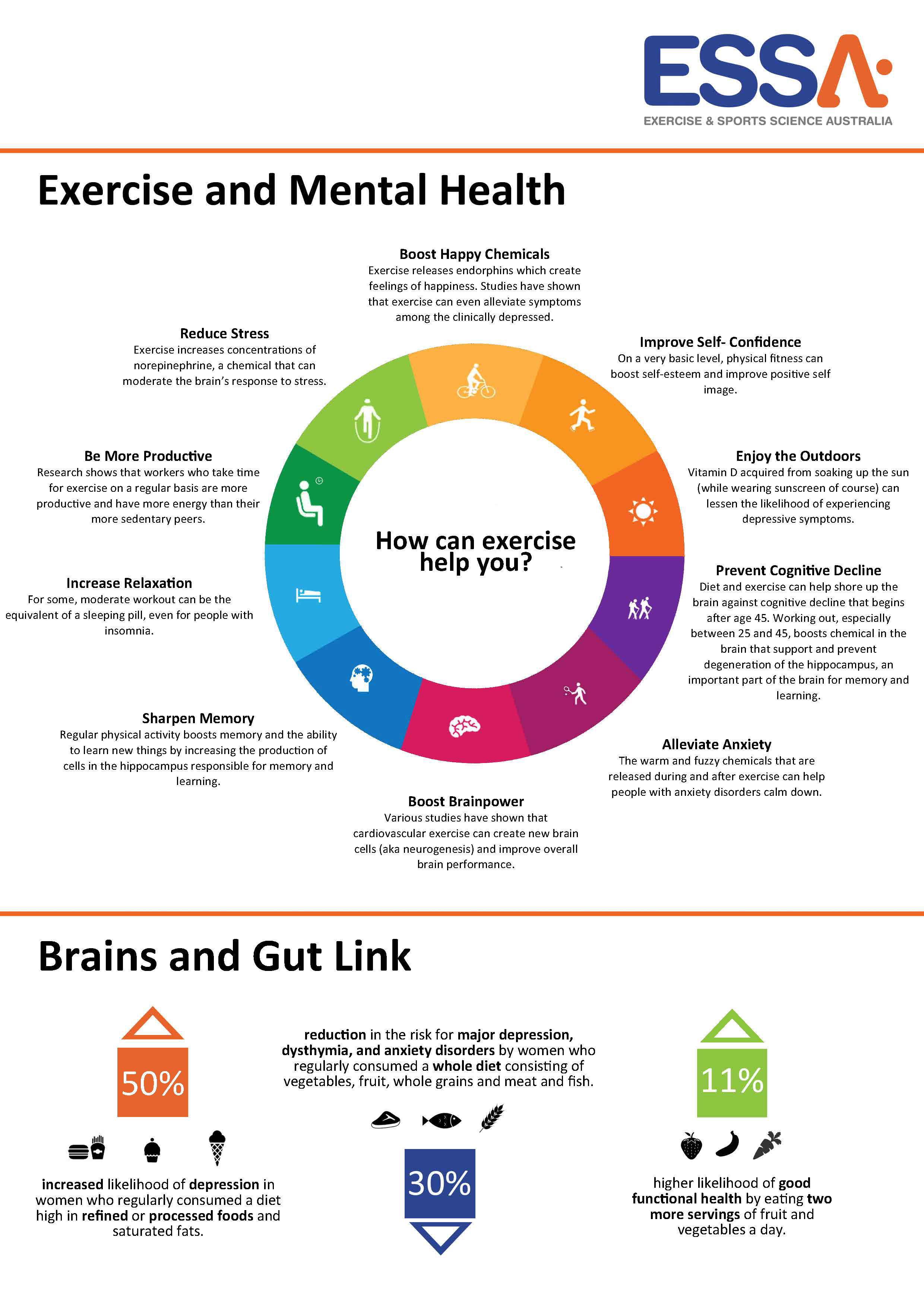Sedentary behaviors and limited physical activity are known to have detrimental effects on health. Now they are also associated with decreased cognitive performance.
 |
| Photo credit: www.healthylifestyleart.com |
 |
 |
| Photo: media.lifespanfitness.com |
Physical health
 |
| Photo: http://howellfoundation.blogspot.com.es/ |
Mental health
Exercising will not only help you elude those fatal diseases and increase your lifespan, but it will also improve your mental health by reducing tiredness, anxiety, bad mood, weight gain and depression; improving self-esteem, sleep, mental alertness and assertiveness; combating alcoholism and drug abuse; and increasing stamina, energy levels and sexual satisfaction. A substantial number of studies have shown that exercising increases positive affect (PA) while decreasing negative affect (NA). PA is an attribute that describes how sentient beings react to positive emotions and interact with their ecosystem. It is related to feelings of confidence, enthusiasm and alertness, whereas NA is characterized by sadness, lethargy and anguish. |
Photo: www.exercise-physiology.com.au |
Cognitive function
All these data are nothing new but the correlation of exercise and mental performance is something of a novelty. |
| Photo: carolynhansenfitness.com |
A recent study has been one of the firsts to demonstrate how watching TV and physical inactivity should be reduced to prevent cognitive aging. The researchers analyzed data from 3247 adults, both black and white aging from 18 to 30, who participated in the Coronary Artery Risk Development in Young Adults (CARDIA) Study. Over 25 years the participants were asked more than 3 times to complete some questionnaires about how much exercise they performed and the amount of TV they viewed. At the end of the trial, contestants did three neuropsychological tests:
- The Digit Symbol Substitution Test (DSST) assesses your memory and processing speed and it is sensitive to brain injury, dementia and depression. It consists of 9 digit symbols, each one paired with a specific number. What the subjects must do is write down the corresponding symbol under each digit as quickly as possible within the time given.
Video: brainbaseline.com
- The Stroop test measures executive functioning, attention and your ability to block distractions. In the test, the participants are shown written name colors in different ink colors (Blue Orange) and they are asked to name the ink color.
- The Rey Auditory Verbal Learning Test (RAVLT) evaluates short-term auditory-verbal memory, including aspects like rate of learning, assimilation strategies or retention of information. Participants are asked to memorize a list of 15 unrelated words and repeat it 5 times with 30 min of rest in between each time.
The results showed that those who spent more hours watching TV and were mostly inactive had poorer cognitive performance in the Digit Symbol Substitution Test and the Stroop Test but not in the Rey Auditory Verbal Learning Test. Low physical activity was strongly correlated to poor performance in the Digit Symbol Substitution Test while inactive people who watched a lot of TV performed 2 times worse than active people who did not spend as much time in front of the TV. In conclusion, too much sitting and too much TV probably leads to slow processing speed and impaired executive function (apart from all the horrendous health & mental effects already mentioned).
All told, the evidence shows that exercise is an effective and low-cost way to significantly improve your quality of life in all areas of health: mental, physical and cognitive. There are enough reasons already to start working out. Sitting around all day will only make your life miserable. It is as simple as throwing on some sneakers and going for a light jog, weightlifting or signing up for a dance class. The possibilities and the reasons to do it are endless, but if you do not commit yourself to doing it, it does not matter how much exercise is praised, you will not do it.
''Health experts often remark that if exercise came in pill form it would be the most sought-after drug on the market.''
References and recommended reading
Ellies, M. (2015, October 28). TV viewing linked to increased risk of death from major causes. Retrieved December 29, 2015, from http://www.medicalnewstoday.com/articles/301693.phpHogan, C., Mata, J., & Carstensen, L. (2013, September 10). Exercise Holds Immediate Benefits for Affect and Cognition in Younger and Older Adults. Retrieved December 29, 2015, from http://www.ncbi.nlm.nih.gov/pmc/articles/PMC3768113/
Hoang, T. et al. (2015, December 2). Effect of Physical Activity and TV Viewing on Cognitive Function. Retrieved December 30, 2015, from http://archpsyc.jamanetwork.com/article.aspx?articleid=2471270
Keadle, S. et al. (2015, December 1). Causes of Death Associated With Prolonged TV Viewing: NIH-AARP Diet and Health Study. Retrieved December 29, 2015, from http://www.ncbi.nlm.nih.gov/pubmed/26215832
Newman, T. (2015, December 2). Watching TV might slow your brain. Retrieved December 30, 2015, from http://www.medicalnewstoday.com/articles/303433.php
Nichols, H. (2015, September 21). The top 10 leading causes of death in the US. Retrieved December 29, 2015, from http://www.medicalnewstoday.com/articles/282929.php
Owen, N., Sparling, P., Healy, G., Dunstan, D., & Matthews, C. (2010, December 1). Sedentary Behavior: Emerging Evidence for a New Health Risk. Retrieved December 29, 2015, from http://www.ncbi.nlm.nih.gov/pmc/articles/PMC2996155/
Sharma, A., Madaan, V., & Petty, F. (2006). Exercise for Mental Health. Retrieved December 29, 2015, from http://www.ncbi.nlm.nih.gov/pmc/articles/PMC1470658/
Taylor, C., Sallis, J., & Needle, R. (1985, April 1). The relation of physical activity and exercise to mental health. Retrieved December 29, 2015, from http://www.ncbi.nlm.nih.gov/pmc/articles/PMC1424736/

Vesigard 15 mg Tablet is muscarinic antagonist that is used in the treatment of overactive bladder. It relieves urinary symptoms like frequent urination, urgent need to urinate, and inability to control urination. Take this medicine in the dose and duration as advised by your doctor.
ReplyDelete